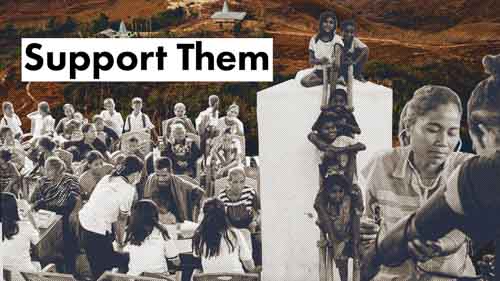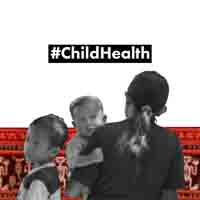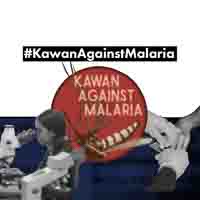Our team has decided to launch a crucial socio-medical initiative in June 2023 for rural communities in eastern Indonesia. This campaign aims to combat the malaria epidemic in the region.
Our programme, expected to last several months, works to reduce the spread of malaria and alleviate the hardships those affected by the disease face. We are committed to achieving this goal by prioritizing the detection (screening), diagnosis, treatment and prevention of malaria in Indonesia’s most affected areas.
Our teams in the field work closely with the local health services, as well as our volunteers, friends, and partners, to combat the devastating effects of malaria in regions with high rates of plasmodium infections. Our goal is to provide comprehensive medical screening, diagnosis, treatment, and prevention measures to ease the suffering of those most affected, particularly children.
We aim to establish a program against Malaria as soon as possible, with the help of God.
Our team is apprehensive about the devastating malaria outbreak in East Sumba. Regrettably, the number of cases has spiked dramatically, with over 28,000 cases reported within the initial three months of 2023, particularly among vulnerable groups such as children. Our latest data reveals that the cases are still rising despite the impending dry season.
Our organisation is dedicated to promoting public health in the region, and we’re deeply concerned about the impact of malaria on vulnerable communities. Sadly, malaria remains a leading cause of illness and death in Indonesia, particularly in East Sumba, where we’re based.
In children, fever is frequently associated with malaria, with a probability of diagnosis of 85%. This map (displayed below) indicates the regions impacted the most by the epidemic and the specific villages we focus on to implement this critical socio-medical program.
Our emphasis is on prevention, and we aim to increase the distribution of mosquito nets, ensure the availability of crucial antimalarial medications, carry out numerous rapid diagnostic tests and for a highly effective strategy for malaria prevention, have more equipment for indoor residual spraying (IRS). Expanding school-based malaria screening to other central sites helps identify people who may have contracted the disease.
The malaria epidemic makes the situation socially and medically very difficult. Families living in rural areas are particularly affected, but we can help reduce its impact by working together.
The fundamental aspects of the malaria control program are outlined below:
Here are the key steps involved in the malaria control program
We aim to accomplish this through a comprehensive initiative that revolves around the ideas and principles we will discuss in brief detail below.
- Central place of work: Mahu District, Mahu Puskesmas, Sumba Timur, Indonesia;
- Teams involved: Over sixty people, including thirty volunteers, doctors, nurses, laboratory technicians, specialists in water and the construction of water installations, logisticians, personnel from social and medical services in the Sumba region Timur, the anti-malaria coordination office;
- Duration on site: A whole week of work in the most affected region;
- The number of people targeted: A significant number of tests, exceeding two thousand, will be conducted alongside visits to nearly one thousand homes. The effects of these efforts will be significant and enduring for the entire region, which is currently the central location for Malaria;
- Working hours: Eighteen hours a day, including six in the evening for outreach work with families in their homes;
- Door-to-door detection: The teams visit all the houses in the area, carrying laboratory equipment such as a microscope, a generator, and other medical devices. Their objective is to assess each house’s condition, including the presence of mosquito nets, stagnant and dirty water, sanitary facilities, tanks and other water storage containers;
- Medical treatment: Individuals who test positive will receive medical attention and instructions on how to complete the treatment, which involves taking medication for three consecutive weeks;
- Ensuring the ability to trace cases and individuals: As part of our program, we will conduct confidential medical interviews with individuals who have tested positive for or previously had Malaria. This will help us collect information on their medical and social situation to create a database and an interactive map of the households, villages, and families involved. Our teams will also take photos of the living conditions and places of residence.
What are the main factors that contribute to its spread?
- First, in this area, the conditions are ideal for breeding mosquitoes that carry malaria (or other diseases). Stagnant water, wet environments, and inadequate sanitation provide an optimal environment for reproduction. The lack of education and information exacerbates the situation, further promoting mosquito breeding,
- Secondly, more resources are required for effective vector control measures, including the distribution of insecticide-treated bed nets or Indoor Residual Spraying (IRS), eradication of mosquito breeding grounds, and enhancing access to healthcare services;
- Thirdly, accessing medical care or centres in rural and remote areas can be tough, leading to delays in diagnosing and treating malaria. This is where the Primary Medical Care Program (PMC) comes in, offering essential health and medical care directly to families where they live;
- Finally, one major issue contributing to the vulnerability of local communities to malaria is a need for more awareness about the disease and how to prevent it. Sadly, this lack of knowledge is compounded by a shortage of essential resources such as funding, personnel, transportation, time, and equipment, which hinders efforts to combat the disease and improve the quality of life for those affected. Political will may also play a role in this ongoing struggle.
As a result, many people, particularly children and pregnant women, continue to suffer from this preventable and treatable disease.
Our program aims to tackle these issues head-on by implementing various activities to strengthen malaria control efforts in the region.
It is crucial to highlight that combatting malaria demands a holistic and unified strategy encompassing preventive and therapeutic measures. It also involves initiatives to enhance the environment and living standards of communities affected by the disease.
Awareness and Education
To combat malaria, increasing community engagement and awareness through education and outreach efforts is crucial.
Fair Future can take various steps towards achieving this, such as creating brochures, posters, or visual aids that provide information about malaria, its transmission, symptoms, and prevention measures (same concept as the Kawan Sehat book you can see here). Presenting this information in the local language is essential to ensure better understanding.
In addition to this, Fair Future, Kawan Baik Indonesia and our allies will organize awareness campaigns in these high-risk regions (see the map below), targeting schools, community centres, and health facilities. This will help us reach as many people as possible and ensure that they are informed about the dangers of malaria and how to prevent it.
Apart from raising awareness, our teams on the field can provide training sessions for health workers and volunteers. These sessions can cover malaria prevention strategies, early recognition of symptoms, and available diagnostic and treatment options. By doing so, we can equip those on the front lines of healthcare with the necessary knowledge and skills to prevent and treat malaria.
Implementation of preventive measures
Fair Future is committed to providing mosquito nets to families who do not yet have them in high-risk areas, prioritizing vulnerable populations such as pregnant women, children, and chronically ill. The mosquito nets will ideally be impregnated with insecticide. Additionally, we will provide instructions on properly using and maintaining the nets.
Our malaria control program in East Sumba integrates Indoor Residual Spraying (IRS), which involves applying insecticides to the interior surfaces of homes in areas at high risk of malaria transmission. We will collaborate with local authorities to organize IRS activities in targeted communities to make this happen. We will train and deploy qualified personnel to spray effectively in each village house.
Our goal is also to encourage participation from the community in environmental management efforts to decrease the number of mosquito breeding sites. To do this, we provide information on the risks of stagnant water in homes -especially places where farm animals are kept, such as pigs, water buffaloes, goats and horses-. We can also define a rehabilitation program for certain villages. We will also focus on improving stormwater drainage systems and sanitary facilities, which we have done for years with the #waterconnections program.
Furthermore, we educate the communities in villages severely impacted by Malaria about proper rainwater storage techniques. This is the water they rely on for daily consumption, including drinking, cooking, and eating. Currently, most water tanks are not air-tight and remain exposed to heat and sunlight, which we aim to rectify.
Diagnosis and screening in rural areas
This initiative aims to establish temporary diagnostic and screening centres in the affected regions. It will employ rapid diagnostic tests for malaria, laboratory equipment and detection via microscope.
Our teams will be equipped with screening equipment, such as a microscope, portable electric generator, and a medical truck called the “Truck of Life”, and will conduct door-to-door visits.
Every house undergoes an analysis as part of our program. If any patients are found to be infected, they will receive the necessary medical treatment for the first seven days. We also guide families in recovering and safeguarding themselves against diseases like Malaria. Additionally, we constantly search for areas with stagnant water and assess the sanitation facilities in the villages as part of our standard protocol.
As a component of medical operations, coordinating “door-to-door” mobile units equipped with Rapid Tests is essential to reach the farthest regions. This can be integrated into the Primary Medical Care (PMC) program, which has proved highly successful. Additionally, extending Malaria screening in schools to other central locations can help identify individuals who may be suspected of having contracted the disease. Take a look at our Malaria image gallery.
It is of utmost importance to promptly provide appropriate antimalarial treatment to individuals who test positive for Malaria. As mentioned above, the first seven days of treatment can be administered directly at home during the “door-to-door” visits. It is crucial to provide clear and concise instructions to families regarding the significance of completing the prescribed medication regimen to eliminate the Malaria infection successfully.
Preparation, treatment and follow-up
Preparation: The local authorities have been in meetings with the Kawan Baik Indonesia and Fair Future teams for several months. We have been conducting fieldwork and are highly conscious of the situation on the ground. Furthermore, the Primary Medical Care Program (PMC) has been operational for months in response to the issue of Malaria in Sumba East.
Our main goal is to pinpoint the requirements, enhance the creation of epidemic maps, and devise straightforward, efficient, and long-lasting action plans to combat Malaria through this program.
Treatments: To improve malaria treatment, fortifying treatment centres and establishing measures that guarantee access to antimalarial drugs, Rapid Tests Kits, laboratory equipment, microscopes, and sufficient reagents are essential.
IRS: Providing materials for Indoor Residual Spraying (IRS), with dedicated insecticides is also crucial to effectively control the spread of malaria. WHO highly recommended incorporating IRS as a part of an integrated vector control plan. This plan may include other techniques like insecticide-treated bed nets, larval source management, and community education programs.
Combining these methods can achieve a more comprehensive and long-lasting impact on malaria transmission.
Thank you very much for your valuable contribution to this crucial malaria control program in one of the regions severely affected by this disease.
Alexandre Wettstein from the Foundation’s Medico-Social Camp in East Sumba, Rumah Kambera, Lambanapu, on May 22nd, 2023.
This program targets specific regions
Rumah Kambera - Fair Future Base Camp in Sumba Timur
Rumah Kambera serves as the heart of the community for hardworking individuals in eastern Indonesia. Our organization implements various programs, including healthcare services, disease prevention measures for illnesses like Malaria, initiatives to ensure access to clean water, and healthy sanitation, provisions for the Primary Medical Care Program, and disaster relief planning. Our dedicated teams are readily available to assist and support anyone in need. Additionally, Rumah Kambera serves as a hub for our team to brainstorm and develop innovative projects for the future.
Mahu, Sumba Timur, East Nusa Tenggara
The Mahu district in East Sumba is being severely impacted by the malaria epidemic. A staggering 80% of children are affected, and unfortunately, the number of adults affected is not yet accounted for. The situation is concerning as all the villages in the Mahu area are classified as "red" due to the high intensity of the epidemic.
Our team's focus in the upcoming months will be on this region as it is the centre of the outbreak. It is imperative that Mahu's Puskesmas (A local small Medical Center) serves as the hub of medical coordination. Our team of over fifty members will be stationed and accommodated in the same area to ensure swift and efficient action.
Kabanda, Sumba Timur, East Nusa Tenggara
Primary Medical Care is a crucial program for the village and Kabanda region, which has been in place since December 2022 and represents a significant human accomplishment. The malaria rate in this area is alarmingly high, affecting over 80% of children, and the distance to medical centres is far too great. As a result, this malaria control program is essential for the region.
Ngadu Ngala, Sumba Timur, East Nusa Tenggara
We recently spent two days working at the local medical centre in Ngadu Ngala, East Sumba. We witnessed the devastating effects of the malaria epidemic on the region and its inhabitants. It's concerning that all villages, including Mahu, are classified as "red" due to the high intensity of the epidemic. The thousands of people living there are in dire need of assistance.







